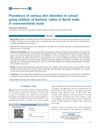 June 2017 in “International Journal of Research in Dermatology”
June 2017 in “International Journal of Research in Dermatology” Skin problems in Timbi were linked to jobs, education, and often improved by treating related health issues, but were worsened by steroid misuse.
 4 citations,
October 2013 in “Clinics in Dermatology”
4 citations,
October 2013 in “Clinics in Dermatology” Experts don't fully agree on how to diagnose certain hair growth disorders and more research is needed to understand them better.
 January 2017 in “Acta dermato-venereologica”
January 2017 in “Acta dermato-venereologica” The congress showed that psychological therapy can help skin condition patients, social media affects acne stigma, education improves atopic dermatitis, and patient satisfaction in dermatology is high, especially with good doctor engagement.
 12 citations,
March 2016 in “BBA clinical”
12 citations,
March 2016 in “BBA clinical” Increased Toll-like receptors in blood cells may contribute to alopecia areata and could be a target for new treatments.
 45 citations,
July 2002 in “The Neurologist”
45 citations,
July 2002 in “The Neurologist” A comprehensive approach to educating patients and managing side effects is crucial for improving adherence to multiple sclerosis treatments and patient quality of life.
 6 citations,
January 2013 in “Indian Journal of Paediatric Dermatology”
6 citations,
January 2013 in “Indian Journal of Paediatric Dermatology” About 69% of school children in Kashmir valley have skin disorders, with eczema and acne being the most common.
 4 citations,
October 2011 in “International Journal of Dermatology”
4 citations,
October 2011 in “International Journal of Dermatology” Bardet-Biedl syndrome may include under-recognized skin problems related to its metabolic disturbances.
2 citations,
January 2015 in “Elsevier eBooks” Epigenetic changes contribute to autoimmune skin diseases.
 14 citations,
January 2016 in “Elsevier eBooks”
14 citations,
January 2016 in “Elsevier eBooks” Liposomes improve the delivery and effectiveness of cosmetic ingredients but face challenges like cost and stability.
 August 2024 in “Indian Journal of Skin Allergy”
August 2024 in “Indian Journal of Skin Allergy” Stem-cell therapy shows promise for skin conditions but needs more research.
 2 citations,
October 2023 in “Philosophical transactions - Royal Society. Biological sciences”
2 citations,
October 2023 in “Philosophical transactions - Royal Society. Biological sciences” Enzymes that change arginine to citrulline are important for skin barrier and hair formation, and their malfunction can lead to skin conditions and hair disorders.
 December 2004 in “Medicine”
December 2004 in “Medicine” Pregnancy can cause skin changes and may affect pre-existing skin conditions, with some treatments not safe for use during pregnancy.
 2 citations,
June 2016 in “Journal of skin and stem cell”
2 citations,
June 2016 in “Journal of skin and stem cell” Wet cupping blood has different components than regular venous blood, which might affect skin disorder treatments.
 1 citations,
May 2018 in “The journal of investigative dermatology/Journal of investigative dermatology”
1 citations,
May 2018 in “The journal of investigative dermatology/Journal of investigative dermatology” The symposium highlighted the importance of understanding disease mechanisms for targeted dermatology treatments.
 86 citations,
October 2017 in “Translational pediatrics”
86 citations,
October 2017 in “Translational pediatrics” Skin changes can help diagnose and manage endocrine disorders like thyroid problems, diabetes, and adrenal gland conditions.
1 citations,
December 2023 in “Molecules/Molecules online/Molecules annual” JAK inhibitors show promise for treating various skin diseases.
 21 citations,
September 2016 in “Journal of Dermatological Treatment”
21 citations,
September 2016 in “Journal of Dermatological Treatment” The new classification system for skin disorders emphasizes the importance of understanding a patient's awareness of their condition for better treatment.
22 citations,
January 2012 in “Mediators of inflammation” Nonantibiotic macrolides show promise for treating various inflammatory skin conditions.
 August 2023 in “Clinical, Cosmetic and Investigational Dermatology”
August 2023 in “Clinical, Cosmetic and Investigational Dermatology” Research on the human skin microbiome has grown, focusing on skin health and diseases, with more studies needed on antibiotic resistance and AI applications.
 March 2018 in “Suez Canal University Medical Journal”
March 2018 in “Suez Canal University Medical Journal” New drugs targeting the JAK-STAT pathway show promise for treating inflammatory skin diseases.
 7 citations,
January 2013 in “Journal of Investigative Dermatology”
7 citations,
January 2013 in “Journal of Investigative Dermatology” Vitamin A may influence hair loss conditions like alopecia, but more research is needed to understand how.
 1 citations,
January 2013 in “Elsevier eBooks”
1 citations,
January 2013 in “Elsevier eBooks” The document reviews various hair and nail disorders, their causes, and treatments, emphasizing the need for proper diagnosis and the link between nail changes and systemic diseases.
 47 citations,
March 2022 in “Frontiers in cellular and infection microbiology”
47 citations,
March 2022 in “Frontiers in cellular and infection microbiology” Changes in skin microbes play a role in some skin diseases and could lead to new treatments.
 7 citations,
February 2021 in “Dermatologic Therapy”
7 citations,
February 2021 in “Dermatologic Therapy” Sebaceous glands are involved in various skin disorders, some treatable with medications like finasteride and minoxidil.
 1 citations,
July 1965 in “Postgraduate medicine”
1 citations,
July 1965 in “Postgraduate medicine” Most skin conditions can be managed with general medical knowledge.
 December 2011 in “Drug Research”
December 2011 in “Drug Research” The document shows the state of pharmaceutical patents as of 1999, focusing on treatments for various diseases.
 November 2017 in “Research Journal of Health Sciences”
November 2017 in “Research Journal of Health Sciences” Skin infections and eczema were most common in all ages, acne in teens and young adults, and nutritional skin problems and infestations in children.
96 citations,
August 1995 in “Bone” Vitamin D3 is important for bone health and may help treat various diseases beyond bone-related conditions.
 12 citations,
November 1970 in “Postgraduate Medical Journal”
12 citations,
November 1970 in “Postgraduate Medical Journal” Some skin diseases and anaemia are related, and treating the skin condition can often improve the anaemia.
 8 citations,
July 2022 in “Biomedicines”
8 citations,
July 2022 in “Biomedicines” Autophagy helps keep skin healthy and may improve treatments for skin diseases.


























